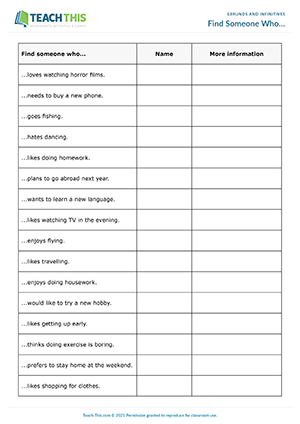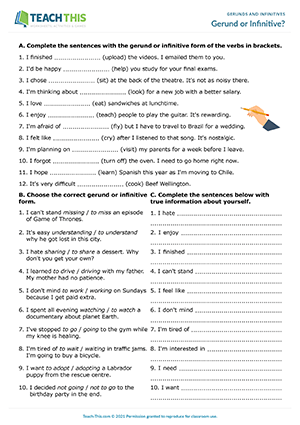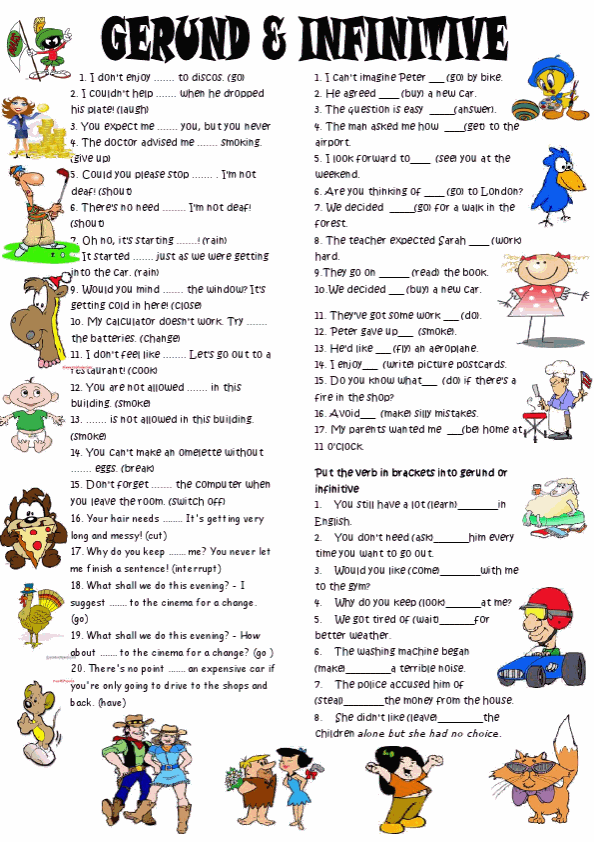Practice using gerunds (-ing) and infinitives (to) with this ESL grammar game. Click the play button to begin.
Loading...
 . Meanwhile infinitives are formed with the word ‘to’ in front of the verb. Both gerunds and infinitives can be used to replace a noun in sentence. Since they act as nouns, they can become the subject of sentence. Read More
. Meanwhile infinitives are formed with the word ‘to’ in front of the verb. Both gerunds and infinitives can be used to replace a noun in sentence. Since they act as nouns, they can become the subject of sentence. Read MoreInfinitive: Practice ING gerunds vs. Infinitive using this ESL fun Game. This game is also excellent for classroom teaching. Teachers can engage students in a classroom vocabulary or grammar review. It is suitable for intermediate and advanced esl learners. Home / Grammar / Verbs / Gerunds vs. Infinitives Quiz 1 About We are dedicated to creating and providing free, high-quality English language learning resources. Board game for speaking practice with gerunds and infinitives. Twenty-three squares with cues for personal experiences etc including more advanced structures - passive gerund, passive infinitive, perfect infinitive, possessive + gerund ('I hope you don't mind my asking'). Consider following up by playing a quick game of charades. Divide the class into two teams and have one person from each team come to the front of the board. Then, write one of the gerunds on the board (for example, 'hunting'). The students at the front are not allowed to look at the board; instead they must watch their teammates act out the word. Play this game to review Grammar. Do you enjoy to football matches? Preview this quiz on Quizizz. Do you enjoy to football matches? Infinitive with To DRAFT. K - University grade. 66% average accuracy.
The following examples help illustrate how they work as subjects of a sentence:- Jogging is a good form of exercise.
- To jog is a good form of exercise.
- I like swimming.
- I like to swim.
- Gerunds – best for use in sentences where action is complete or have been completed, or real. For example – I stopped answering the phone. Here it means I was answering the phone all along and now I just completed answering the phone and moved on to something else.
- Infinitives – best for use in sentences about actions that will either occur in the future, are unreal or simply abstract. For example – I stoppedto answer the phone. Here it means I was in the middle of something, then first I stopped, then I answer the phone next.
Exercise 1
Choose the correct infinitives and gerunds to complete the sentences below.
Gerund
We use the gerund (-ing)
1 When the verb is the subject of a sentence.
- Reading on tablets and phones isn’t very good for your eyes.
2After a preposition.

- I’m tired of waiting. Let’s go home.
3 After some verbs.
- I don’t mind waiting.
- She recommended visiting this museum.
Common verbs followed by a gerund
Some common verbs that are followed by gerund are: avoid, enjoy, finish, hate, keep, like, love, don’t mind, prefer, recommend, spend time, stop, suggest, etc.
Gerund And Infinitive Game
Negative gerund
The negative form of the gerund is not +-ing.
- He enjoys not having to wake up early at weekends.
Infinitive without to
We use the infinitive without to
1 After the auxiliary verb do, does, did in negative sentences and questions.
- He didn’t say anything.
- Does Tim work with you?
- I don’t believe you.
2 After modal verbs (will, can, must, should, might, may,etc.)
Gerund Vs Infinitive Esl
- You should come with us.
- I can’t play the guitar.
to + infinitive
We use the infinitive with to
1 After adjectives.
- It’s important to arrive early at the station.

2 To express a reason or purpose (why).
- I went to Madrid to visitsome family.
- I need time to study for the exam.
3 After question words.

Gerund Or Infinitive Game Online
- I don’t know what to eat.
- I want to learn how to play the guitar.
4 After some verbs.

- Don’t forget to call me.
- She seems to bedistracted.
Common verbs followed by to + infinitive
Some common verbs that are followed by toinfinitive are: decide, forget, help, hope, learn, need, offer, plan, promise, remember, seem, try, want, would like, would love, would hate, would prefer, etc.
Negative form of to + infinitive
The negative form of to + infinitive is not to + infinitive.
- She decided not to enter the competition.